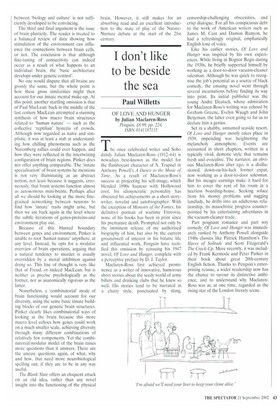I don't like to be beside the sea
Paul Willetts
OF LOVE AND HUNGER by Julian Maclaren-Ross Penguin, £8.99, pp, 224, ISBN 0141187115 The once celebrated writer and Soho dandy Julian Maclaren-Ross (1912-64) is nowadays best-known as the model for the flamboyant character of X. Trapnel in Anthony Powell's A Dance to the Music of Time. As a result of Maclaren-Ross's success at projecting his self-image, which blended 1890s hauteur with Hollywood cool, his idiosyncratic personality has obscured his achievements as a short storywriter, novelist and autobiographer. With the exception of Memoirs of the Forties, his definitive portrait of wartime Fitzrovia, none of his books has been in print since his premature death. Prompted not only by the imminent release of my authorised biography of him, but also by the current groundswell of interest in his bizarre life and influential work, Penguin have rectified this omission by reissuing his 1947 novel, Of Love and Hunger, complete with a perceptive preface by D. J. Taylor.
Maclaren-Ross first achieved prominence as a writer of innovative, humorous short stories about the seedy world of army billets and drinking clubs that he knew so well. His stories tend to be narrated in a chatty style, punctuated by slang, censorship-challenging obscenities, and crisp dialogue. For all his conspicuous debt to the work of American writers such as James M. Cain and Damon Runyon, he had a refreshingly original, emphatically English tone of voice.
Like his earlier stories, Of Love and Hunger was inspired by his own experiences. While living in Bognor Regis during the 1930s, he briefly supported himself by working as a door-to-door vacuum-cleaner salesman. Although he was quick to recognise the job's potential as a source of black comedy, the ensuing novel went through several incarnations before finding its way into print. Its initial publisher was the young Andre Deutsch, whose admiration for Maclaren-Ross's writing was echoed by Graham Greene, Evelyn Waugh and John Betjeman, the latter even going so far as to declare him a genius.
Set in a shabby, unnamed seaside resort, Of Love and Hunger mostly takes place in 1939, impending war heightening the melancholy atmosphere. Events are recounted in short chapters, written in a typically vivid, demotic style that remains fresh and evocative. The narrator, an obvious Maclaren-Ross alter ego, is a disillusioned, down-on-his-luck former expat, now working as a door-to-door salesman. But his meagre earnings make it hard for him to cover the rent of his room in a heerless boarding-house. Seeking solace from his money problems and nagging landlady, he drifts into an adulterous relationship, its masochistic progress counterpointed by his entertaining adventures in the vacuum-cleaner trade.
Part poignant romance and part wry comedy, Of Love and Hunger was immediately ranked by Anthony Powell alongside 1940s classics like Patrick Hamilton's The Slaves of Solitude and Scott Fitzgerald's The Crack-Up. More recently, it was included by Frank Kermode and Peter Parker in their book about great 20th-century English fiction. Thanks to Penguin's enterprising reissue, a wider readership now has the chance to savour its distinctive ambience, and to understand why MaclarenRoss was at, at one time, regarded as the rising star of the London literary scene.










































































 Previous page
Previous page